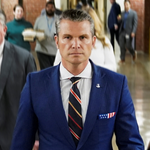
The moment the second presidential debate between John McCain and Barack Obama ended, I quickly tapped out e-mails to a half dozen name-brand Republican strategists not affiliated with the McCain campaign. The response was unanimous: Not a single one of these GOP heavies thought their party’s nominee had won. “Obama presidential … no narrative change,” was one of the replies. Another was, “We gained no ground … the generational contrast was stunning.” The rest were even more downcast. “McCain looked angry and anything but steady,” replied a Republican media maven who has been involved in more than one general-election contest. “Big win for Obama.”
I couldn’t agree more. McCain entered this debate facing a fierce headwind, slipping in both national and battleground state polls, laboring under the weight of a financial meltdown that is definitively not his friend. His central goal in the debate, therefore, was to alter the dynamic of the race in a dramatic way.
What was weird was that McCain not only failed to do so but that he barely seemed to try, contrary to expectations that he would go after Obama hammer and tongs. He seemed to me less irritable, less visibly ticked-off, than he did in the first debate. He expressed economic empathy more effectively, too. But he also came across as older, frailer, more rickety. The town-hall format was supposed to be his metier, but it worked to his disadvantage. He rattled around onstage looking slightly lost, making hokey jokes that fell flat in the hall, offering edgy barbs at Obama (and even Tom Brokaw!), and telling hoary stories that referenced Ronald Reagan, Teddy Roosevelt, Tip O’Neill, and Herbert Hoover — historically significant figures who reinforced the image of the Arizona senator as yesterday’s man. His much-noted reference to Obama as “that one” struck me less as disrespectful and more as grandfatherly (or even grandmotherly, the kind of epithet hurled at a misbehaving teenager by his dismayed nana).
For Obama, by contrast, the format proved to be an unexpected blessing. His height and his physical fluidity made him a much more commanding stage presence than his rival. In the debate’s first half, on the economy and domestic issues, he was “a message machine,” in the assessment of one old Bill Clinton hand. “He made contact with the middle class in every answer he could. He had a strategy. He raked McCain on tax cuts for the wealthy, he related to average people, he knew how much gasoline costs, how much teachers make. He was emotionally congruent with the moment. He did contrast without being bilious.”
Obama had two particularly strong moments in this regard. The first was his clear and concise explanation of how the Wall Street bailout would benefit ordinary voters (after McCain first condescended to the questioner, telling him “I’ll bet you, you may never even have heard of [Fannie Mae and Freddie Mac] before this crisis,” and then called him by the wrong name), which buried the notion that Obama’s occasionally professorial demeanor is always and forever a weakness. The second was his unambiguous declaration that health care “should be a right for every American,” which he then followed up with a crisp piece of populism in response to McCain’s charges that he wants to meddle too intrusively in the provision of medical care: “It is absolutely true that I think it is important for government to crack down on insurance companies that are cheating their customers, that don’t give you the fine print, so you end up thinking that you’re paying for something and, when you finally get sick and you need it, you’re not getting it.”
Obama’s slam-dunk flourish, however, came during the discussion of foreign policy, allegedly McCain’s strong suit. It began with a malapropism —“Now, Senator McCain suggests that somehow, you know, I’m green behind the ears and, you know, I’m just spouting off, and he’s somber and responsible” — but ended with a bang: “Senator McCain, this is the guy who sang, ‘Bomb, bomb, bomb Iran,’ who called for the annihilation of North Korea. That I don’t think is an example of ‘speaking softly.’ This is the person who, after we had — we hadn’t even finished Afghanistan, where he said, ‘Next up, Baghdad.’”
Unlike Obama, who never once seemed flummoxed by the attacks uncorked by McCain, the Republican nominee was rattled, stammering out a response that was pitiful by any measure. “Not true, not true,” he said. “I understand what it’s like to send young American’s in harm’s way. I was joking with a veteran — I hate to even go into this. I was joking with an old veteran friend, who joked with me, about Iran. But the point is that I know how to handle these crises … I’m going to act responsibly, as I have acted responsibly throughout my military career and throughout my career in the United States Senate.” In other words, trust me because … well, just because.
The debate ended with a question that Brokaw described as having a “Zen-like quality”: “What don’t you know and how will you learn it?” Obama’s answer was smooth and emotionally affecting: a nod to Michelle, his mother, his grandmother, and a reminder of his modest background. McCain’s answer — which concluded with him talking about his many years of service to the country and “asking the American people to give me another opportunity” — sounded eerily like Bob Dole in 1996, making a plea for “one last mission.” As one of the progenitors of the McCain-is-Dole meme, I may be a bit too prone to see the similarities between the two men and their candidacies. But I couldn’t help but think back to the moment in Dole’s bid against Bill Clinton — just about a month out from Election Day then, too — when it became clear that, absent some crazy-ass external event, the race was basically over. Twelve years later, it’s déjà vu all over again.
Related: Handshakes, Drinking Games, “That One”: The Really Important Debate Stuff! [NYM]
McCain Calls Obama ‘That One’: Why? [NYM]
Matthew Yglasias and Garrett M. Graff on the Election’s Generational Divide [NYM]





























